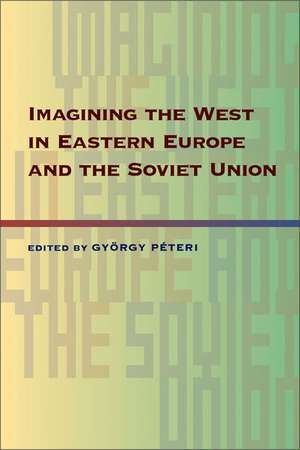Imagining the West in Eastern Europe and the Soviet Union: Russian and East European Studies
Editat de Gyorgy Peterien Limba Engleză Paperback – 28 noi 2010
This volume presents work from an international group of writers who explore conceptualizations of what defined “East” and “West” in Eastern Europe, imperial Russia, and the Soviet Union. The contributors analyze the effects of transnational interactions on ideology, politics, and cultural production. They reveal that the roots of an East/West cultural divide were present many years prior to the rise of socialism and the cold war.
The chapters offer insights into the complex stages of adoption and rejection of Western ideals in areas such as architecture, travel writings, film, music, health care, consumer products, political propaganda, and human rights. They describe a process of mental mapping whereby individuals “captured and possessed” Western identity through cultural encounters and developed their own interpretations from these experiences. Despite these imaginaries, political and intellectual elites devised responses of resistance, defiance, and counterattack to defy Western impositions.
Socialists believed that their cultural forms and collectivist strategies offered morally and materially better lives for the masses and the true path to a modern society. Their sentiments toward the West, however, fluctuated between superiority and inferiority. But in material terms, Western products, industry, and technology, became the ever-present yardstick by which progress was measured. The contributors conclude that the commodification of the necessities of modern life and the rise of consumerism in the twentieth century made it impossible for communist states to meet the demands of their citizens. The West eventually won the battle of supply and demand, and thus the battle for cultural influence.
The chapters offer insights into the complex stages of adoption and rejection of Western ideals in areas such as architecture, travel writings, film, music, health care, consumer products, political propaganda, and human rights. They describe a process of mental mapping whereby individuals “captured and possessed” Western identity through cultural encounters and developed their own interpretations from these experiences. Despite these imaginaries, political and intellectual elites devised responses of resistance, defiance, and counterattack to defy Western impositions.
Socialists believed that their cultural forms and collectivist strategies offered morally and materially better lives for the masses and the true path to a modern society. Their sentiments toward the West, however, fluctuated between superiority and inferiority. But in material terms, Western products, industry, and technology, became the ever-present yardstick by which progress was measured. The contributors conclude that the commodification of the necessities of modern life and the rise of consumerism in the twentieth century made it impossible for communist states to meet the demands of their citizens. The West eventually won the battle of supply and demand, and thus the battle for cultural influence.
Din seria Russian and East European Studies
-
 Preț: 422.97 lei
Preț: 422.97 lei -
 Preț: 332.66 lei
Preț: 332.66 lei -
 Preț: 396.90 lei
Preț: 396.90 lei -
 Preț: 428.75 lei
Preț: 428.75 lei - 15%
 Preț: 678.74 lei
Preț: 678.74 lei -
 Preț: 433.53 lei
Preț: 433.53 lei -
 Preț: 238.43 lei
Preț: 238.43 lei -
 Preț: 391.67 lei
Preț: 391.67 lei -
 Preț: 436.25 lei
Preț: 436.25 lei -
 Preț: 295.91 lei
Preț: 295.91 lei -
 Preț: 326.41 lei
Preț: 326.41 lei -
 Preț: 127.24 lei
Preț: 127.24 lei -
 Preț: 123.55 lei
Preț: 123.55 lei -
 Preț: 315.41 lei
Preț: 315.41 lei -
 Preț: 349.81 lei
Preț: 349.81 lei -
 Preț: 485.99 lei
Preț: 485.99 lei - 15%
 Preț: 493.66 lei
Preț: 493.66 lei -
 Preț: 474.45 lei
Preț: 474.45 lei -
 Preț: 317.63 lei
Preț: 317.63 lei -
 Preț: 502.16 lei
Preț: 502.16 lei -
 Preț: 431.62 lei
Preț: 431.62 lei -
 Preț: 113.42 lei
Preț: 113.42 lei -
 Preț: 422.00 lei
Preț: 422.00 lei -
 Preț: 395.54 lei
Preț: 395.54 lei -
 Preț: 179.30 lei
Preț: 179.30 lei -
 Preț: 397.45 lei
Preț: 397.45 lei -
 Preț: 470.60 lei
Preț: 470.60 lei -
 Preț: 171.58 lei
Preț: 171.58 lei -
 Preț: 461.94 lei
Preț: 461.94 lei -
 Preț: 363.26 lei
Preț: 363.26 lei -
 Preț: 272.52 lei
Preț: 272.52 lei -
 Preț: 352.86 lei
Preț: 352.86 lei -
 Preț: 184.58 lei
Preț: 184.58 lei -
 Preț: 389.76 lei
Preț: 389.76 lei -
 Preț: 468.65 lei
Preț: 468.65 lei -
 Preț: 432.57 lei
Preț: 432.57 lei -
 Preț: 182.40 lei
Preț: 182.40 lei -
 Preț: 388.79 lei
Preț: 388.79 lei -
 Preț: 141.48 lei
Preț: 141.48 lei -
 Preț: 426.63 lei
Preț: 426.63 lei -
 Preț: 465.76 lei
Preț: 465.76 lei -
 Preț: 126.00 lei
Preț: 126.00 lei -
 Preț: 283.50 lei
Preț: 283.50 lei -
 Preț: 403.43 lei
Preț: 403.43 lei - 23%
 Preț: 568.69 lei
Preț: 568.69 lei - 23%
 Preț: 565.89 lei
Preț: 565.89 lei - 23%
 Preț: 556.25 lei
Preț: 556.25 lei -
 Preț: 385.91 lei
Preț: 385.91 lei -
 Preț: 422.97 lei
Preț: 422.97 lei -
 Preț: 385.53 lei
Preț: 385.53 lei
Preț: 424.88 lei
Nou
Puncte Express: 637
Preț estimativ în valută:
81.30€ • 86.94$ • 67.79£
81.30€ • 86.94$ • 67.79£
Carte tipărită la comandă
Livrare economică 17 aprilie-01 mai
Preluare comenzi: 021 569.72.76
Specificații
ISBN-13: 9780822961253
ISBN-10: 0822961253
Pagini: 336
Dimensiuni: 152 x 229 x 28 mm
Greutate: 0.5 kg
Ediția:1
Editura: University of Pittsburgh Press
Colecția University of Pittsburgh Press
Seria Russian and East European Studies
ISBN-10: 0822961253
Pagini: 336
Dimensiuni: 152 x 229 x 28 mm
Greutate: 0.5 kg
Ediția:1
Editura: University of Pittsburgh Press
Colecția University of Pittsburgh Press
Seria Russian and East European Studies
Recenzii
“A rich and diverse collection of articles exploring the multiple levels of popular and official perceptions by East Europeans and Russians of the West, unified by a set of central themes that illuminate their ambivalent, entangled, and interactive features and firmly anchored fore and aft by Péteri and Michael David Fox.”
—Alfred J. Rieber, Central European University
—Alfred J. Rieber, Central European University
“A wonderfully sophisticated exploration of the porous boundaries of ‘East-West’ identities among educated Eastern Europeans. The book is a transnational look at cultural transformations under the impact of de-Stalinization and cold war contest for people’s minds. A refreshing antidote to numerous volumes that erect a post–cold war cultural wall between Russia and its western neighbors.”
—Vladislav Zubok, Temple University
—Vladislav Zubok, Temple University
“Tightly focused in content yet wide-ranging in time, place and methodology. Highly recommended.”
—Choice
—Choice
“Taken as a whole, the essays in this anthology hold together better than most such volumes as they hone in on the tensions, contradictions, and layers of cultural understanding and conflict between East and West, mostly under the long shadow cast by the Cold War and its competing modernities.”
—The Russian Review
—The Russian Review
“This volume clearly indicates that understanding the region’s history requires us to move beyond the constraints of national histories, as we recognize the importance of interconnectedness and transfers that crossed physical and ideological borders. This inspiring collection points to further sites of research in the fields of cultural and social history, cultural diplomacy, and the history of everyday life . . . deserves a wide audience.”
—Austrian History Yearbook
—Austrian History Yearbook
Notă biografică
Gyorgy Peteri is professor of contemporary European history at Norwegian University of Science and Technology, Trondheim. He is the author of four books on Eastern European history, most recently Global Monetary Regime and National Central Banking: The Case of Hungary, 1921–29.
Descriere
An international group of writers explore conceptualizations of what defined “East” and “West” in Eastern Europe, imperial Russia, and the Soviet Union. The contributors analyze the effects of transnational interactions on ideology, politics, and cultural production.









